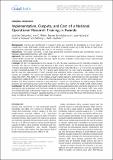| dc.description.abstract | Background:
Training and mentorship in research skills are essential to developing a critical mass of researchers in low- and middle-income countries (LMICs). However, reporting on the details of such training programs, especially regarding the cost of the training, is limited.
Objectives:
This paper describes a year-long operational research training and mentorship course in Rwanda, implemented between 2013 and 2017.
Approach:
We describe motivations for the design of the Intermediate Operational Research Training Course (IORT) across four iterations. We also report outputs, evaluate trainee experiences, and estimate training and mentorship costs.
Findings:
Of the 132 applicants to the course, 55 (41.7%) were selected, and 53 (96.4%) completed the training. The ratio of female-to-male trainees in the course increased from 1:8 in 2013 to 1:3 in 2017. Trainees developed and co-first-authored 28 research manuscripts, 96.4% (n = 27) of which are published in peer-reviewed journals. For the 15 trainees who completed the post-course evaluation, 93.3% and 86.7% reported improvement in their research and analytical skills, respectively. The median cost per trainee to complete the course was US$908 (Range: US$739–US$1,253) and per research project was US$2,708 (US$1,748–US$6,741). The median annual training delivery and mentorship cost was US$47,170 (US$30,563–US$63,849) for a course with a Rwanda-based senior mentor, junior mentor, and training coordinator. The total essential cost for a year-long IORT course with 16 trainees co-leading eight research projects and mentored by two senior and four junior mentors was US$101,254 (US$73,486–US$157,569).
Conclusion:
We attribute the high course completion rates, publication rates, and skills acquisition to the learning-by-doing approach and intensive hands-on mentorship provided in the course. IORT was costly and funded through institutional resources and international partnerships. We encourage funders to prioritize comprehensive research capacity-building initiatives that provide intensive mentorship as these are likely to improve the pool of skilled researchers in LMICs. | en_US |

